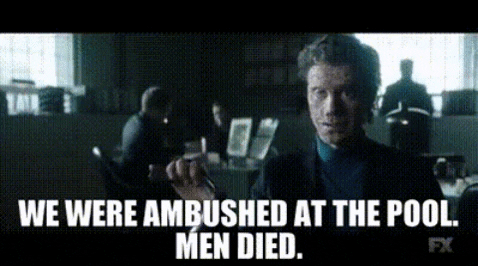
Bureau 19 has recommended desk duty.
Clark :
Perfect.
Except, you know, in The Field.
What?
Clark :
I said, that's great.
Desk duty.
Perfect.
I'll bring the desk with me.
That was my feeling.
Small desk, obviously.
Maybe it folds up.
But that way I'll have it while I'm Making The World Safe for Democracy some more.
Specialists don't —
Clark :
Yeah, okay.
Here's The Deal —
I have burns over 40% of my body and I spent six weeks with a tube jammed into the head of my dick while my husband cried himself to sleep every night.
We were ambushed at The Pool.
Men Died.
And I am going to finish what I started.
So if you want me behind a desk, you better find a portable one.
Because the second I walk out of this room, I'm going to War.
“Perhaps these are the perfect conditions for Mentorship: a Mentor, a Mentee, a Method and an Institute. The Hindu guru–disciple relationship typically functions along these lines, as does martial arts training.
Interestingly, neither of these paths have an obvious Western counterpart; the most obvious comparison – trade apprenticeship – is contextualized by commerce and professional necessity. In my experience, mentorship is more successful when there is no financial component.
The most immediate and obvious thing that Chip taught me was that it is okay to talk about your feelings, more than okay, MANDATORY.
In fact that’s ALL we did, talked about feeling vulnerable, inadequate, fearful and angry.”
Abhinava tells us that the process of creative contemplation or holistic meditative inquiry (bhāvanā-krama) that leads to experiential knowing of reality is based on these three supports:
❖ sound and careful reflection on your experience (sat-tarka)
❖ the guidance of a great teacher (sad-guru) who is skilled in meditative enquiry and has attained its fruit
❖ the wisdom of the scriptures (sad-āgama)
When these three come together in agreement, Abhinava suggests, we know we have arrived at Truth.
One or two of them is insufficient for certainty.
In fact, allowing ourselves to abide in uncertainty about anything not supported by all three keeps us open and in a process of learning that closes down if we prematurely decide that we know.
No comments:
Post a Comment